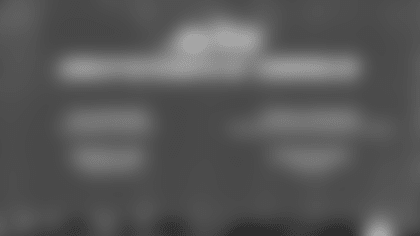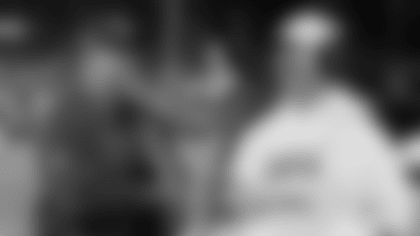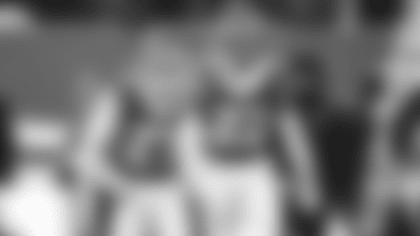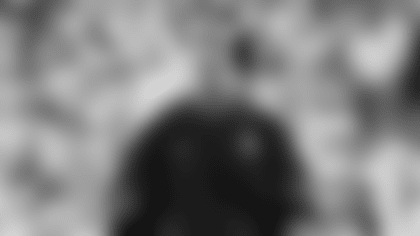
Drafted in 2020 from the University of North Carolina at Charlotte, Cameron Clark may not have been able to ever play in a regular season game, but he'll always be a Jet.
As a rookie, the offensive tackle's enthusiasm and attitude were in the right place. Unfortunately, his body didn't follow suit.
"It was definitely a lot of adversity early on in my career," Clark said. "Throughout college, I never missed a game. And then coming to the Jets and having back-to-back shoulder injuries and then a knee injury, it was tough. But honestly, I grew a lot during that time."
Spending the first six weeks of the season on injured reserve because of the shoulder injuries, Clark was then inactive for seven games and didn't play in three others.
Ready for a fresh start in 2021, Clark went down six days into training camp while pass-blocking during an 11-on-11 session. He collided with a defensive end, hit the ground, and didn't get back up. Suffering a spinal cord injury, he had no feeling in his lower extremities and was taken by ambulance to a local hospital.
It was two hours before he began to get feeling back in his legs and arms.
"That was one of the best feelings in the world," Clark said. "At that point, I still thought that I'd be able to play the game. So I was mostly concerned with finishing training camp."
That wouldn't happen. Within a week after the injury, Clark sought a second opinion from Dr. Andrew Hecht, an orthopedic surgeon at New York's Mt. Sinai Hospital.
"He told me I had something called transient quadriplegia, which means losing feeling in more than one limb at one time," Clark said. "And he told me that if I continue to play football, there's a 50 percent chance that that would happen on every play. And that there's a good chance that I won't be as lucky as I was to regain feeling. It was absolutely a gut punch.
"I had spoken with Coach Saleh and Joe Douglas, and they both told me that they're looking to have me back by at least the second or third preseason game. And then being told that (by the doctor), I mean, it was traumatic considering everything that I worked for my entire life up until this point. Everything that I had was attached to my identity, my self-image, all of those things. Having that taken away from me, put me in a pretty vulnerable spot. Especially at a young age where I thought I was going to be able to play the game for the next eight to 10 years.
"I'd say the first year after that injury was why me? Just not understanding. I felt some sort of a denial. Really, embarrassment for how short my career was. But on the other side of that, I truly now understand how blessed I was to be able to play the game at all. And to make it to the level that I made it at, the relationships that I've built, and the impact that I still continue to plan on having on the game, I feel like it just makes me all the more prepared for what I'm doing now."
After he stopped playing, Clark felt that football was like a bad breakup. He didn't go to games. He didn't watch them on TV. He didn't even want to talk to his football friends. But two years ago, he went to his alma mater's spring practice and ended up talking with some of the players and helping them on the field after the session was over. The head coach, Will Healy, noticed and approached Clark about joining his staff.
"I started as an offensive line coach," he said. "I worked with those guys for several months and that truly brought me back to the game, and showed me that there was a place in the game for me. It just wasn't on the field."
Last April, Clark's friendship with offensive tackle Mekhi Becton, who was the team's first-round pick in the same draft class as Clark, and had been sidelined for nearly two full seasons, led him to return to New York.
It wasn't on the field, but last season, it was back with the Jets. "It initially started off as an internship with the player engagement department, and we did that from the beginning of OTAs until the end of training camp," Clark said. "And then I was actually a consultant for the team last year through my business, Abundance Performance, and I helped with the offensive line that way."
With options to coach in college as an offensive analyst, Clark chose to start the company so he'd be able to have an impact on offensive lineman around the country on a broader scale, not just the 12 to 15 he'd have on a team.
"The main reason I started Abundance Performance is because when you work for a university or a club, you have to look out for the best interest of the club or the university. I really, truly wanted to look out for the best interest of the players. And I think Abundance Performance allows me to do that and kind of be that person that I needed," Clark said.
"I believe in transforming the mind and the spirit. Not from a religious standpoint, but more so just the way that you're living. Finding consistency within the way that you view yourself, the way that you view the world. And so it started mentally, spiritually. And then I truly believe once we transform the mental and spiritual of a person, the physical is soon to follow. And that's honestly the easiest part.
"(When you see that you're making a difference) it's one of the greatest feelings in the world because it truly takes trust. It takes them trusting me, and then kind of almost giving me the keys to their career. And that's something that I don't take lightly."
And the best thing about being Cameron Clark today?
"Being able to impact other young men who are going through similar things that I went through," he says, "as far as playing the game, trying to figure out where they fit in the grand scheme of things, and really maximizing their careers with the short amount of time they do have."














